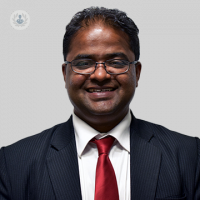PCOS and its effect on body weight
Escrito por:For some women living with polycystic ovary syndrome (PCOS), they may find it hard to lose weight because their insulin levels are elevated and therefore their body is unable to handle carbohydrates so easily. Unless they make some changes to their dietary habits by eating low carb and cutting out processed foods, it remains difficult for an overweight woman with PCOS to lose weight.
Mr Himanshu Borase is a consultant gynaecologist and fertility specialist and here he explains how to keep your weight in check if you are living with PCOS.

What’s the role of insulin with PCOS?
Insulin is the only hormone that allows you to handle carbohydrates properly and in patients with PCOS even though they are not diabetic, they behave like they are. Due to resistance to insulin at the receptive level, their bodies are unable to handle carbohydrates easily. It's the insulin resistance that leads to different symptoms such as excessive growth of facial hair or male pattern baldness.
Not all women with PCOS are overweight and around 30 per cent of patients fall into a group called lean phenotype where they are thin. They too face fertility challenges and an increased risk of diabetes.
Are you more likely to be at risk of diabetes if you have PCOS?
Yes, women with PCOS are at risk of type 2 diabetes in the latter half of their life and they are at a slightly increased risk of diabetes in pregnancy. It is tricky to get pregnant with PCOS because of a hormonal imbalance. The woman is not releasing eggs regularly, which is why they have irregular cycles and because of this, it is a struggle to conceive.
What are the other risks associated with PCOs-related weight gain?
The risks associated with PCOS occur because the woman is overweight and they lack the hormone progesterone. Progesterone is secreted after ovulation so that the woman is in a hypoestrogenic state, which means that their oestrogen is higher than their normal counterpart. The high levels can lead to abnormal changes in the lining of the uterus, which is why the woman is at a slightly increased risk of endometrial cancer in the future.
What other conditions can mimic PCOS?
If the patient is overweight, they may have an adrenal tumour that secretes excess testosterone. Adrenal tumours can mimic other symptoms of PCOS, such as excess hair on the body and alopecia.
How is PCOS diagnosed?
PCOS is a syndrome and not a condition. It is diagnosed if the woman is experiencing two out of three things. The first is if their periods are in irregular cycles. The second is if scan results show that they have 12 or more follicles on either side of their ovaries. Finally, we look at if there is biochemical or clinical evidence of excess male hormones in the system, which manifests as oily skin etc.
How can a woman keep her weight in check if living with PCOS?
It is tricky but it is possible for a woman with PCOS to keep their weight in check if they make changes to their diet. I prefer to call it ‘lifestyle modifications’ as opposed to a diet. I suggest they cut down on their carbohydrate intake, increase the amount of protein that they eat and participate in regular exercise.
Sometimes, once a woman has been diagnosed with PCOS, we can give them medication or supplements such as Metformin or Inositol to lower the insulin resistance. We always recommend a targeted approach. When I see my patients, I explain their weight, BMI and the target weight that they need to achieve. Sometimes weight loss as low as 15-20% can regulate cycles and the woman can get pregnant on their own.
Can PCOS be treated?
People are born with PCOS, will live with it and can only control the symptoms because getting pregnant is not an issue. They can regularise their cycles with the contraceptive pill or their lining can be protected with the hormone coil.
A woman with PCOS should seek help sooner rather than later because the syndrome can co-exist with endometriosis. Treatment depends on the woman’s priority; if it’s just to regularise their cycle or if they want to get pregnant, we will decide what is the ideal plan for them.
Read more: living with endometriosis
If they want to get pregnant, we have to check their tubes first and give them ovulation induction medication. If that does not help, we sometimes operate on the woman with an operation known as ovarian diathermy where four holes are made on each ovary to change the local hormone imbalance and enable them to regulate their cycle.
This should increase their chance of spontaneous conception but if it does not help then the next step is ovulation induction, which is the same injection used with in-vitro fertilisation (IVF) but in a smaller dose. If that doesn’t work then we try IVF.
Do not hesitate to book an appointment with Mr Borase if you would like to discuss your own experiences with PCOS and any problems with conceiving.


